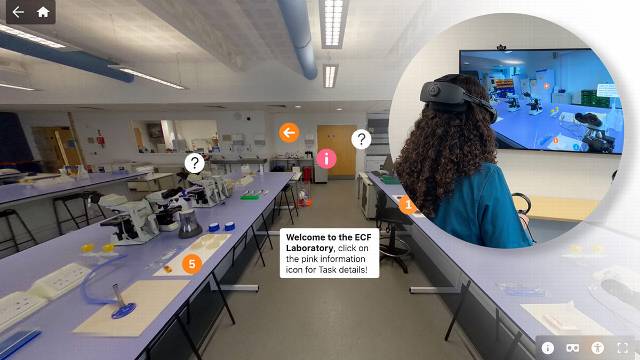
It’s National Careers Week #NCW21 so we’re showcasing some of the careers our degrees can take you to. Today we’re talking about all thing animals.
It isn’t uncommon to want to work with animals - those who adore their pets often dream of having a career that will allow them to spend all day, every day with creatures great and small.
A common first thought is a career as a veterinarian. And while we do offer Veterinary Medicine and Surgery degrees through the Harper & Keele Vet School, which is seeking to make veterinary education more accessible, Harper Adams University offers a vast range of other routes – and therefore career paths – for those wishing to work with animals.
Animal Behaviour – study our clinical route to qualify as a Certified Clinical Animal Behaviourist (non clinical route also available). Behaviourists don’t work only with pets – as our new lecturer Ellen Williams will tell you. Ellen has worked extensively with elephants and more recently meerkats! Indeed, this degree subject could lead to a career working with any species.
“I always wanted to study more about animals, but I was unsure of the specific career path I wanted to take when I started university. This breadth of studies helped me to understand where my core interests were and tailor my degree towards this,” Hannah Lomas, Animal Behaviour graduate.
Animal health and welfare – provides a broader overview of welfare science, providing a range of career opportunities, from working in animal rescue to supporting welfare schemes in the food industry.
Animal production science – more allied to our agricultural routes at Harper Adams, a degree in animal production science or one in agriculture with animal science, could see you specialise in the entire workings of livestock farming, from a scientific point of view.
Veterinary Bioscience is a fascinating area of work – focussed on the science behind preventing and treating animal disease and improving their overall health. Rather than learning to diagnose and directly treat animals, veterinary bioscientists might work in laboratory research developing new animal medicines, in animal nutrition, biotechnology or even go on to become Government animal health inspectors.
“I really enjoyed how varied the Bioveterinary Science course was. Ranging from companion animals to farm animals, and from nutrition to genetics, no two modules were the same,” says Melanie Stokes, Veterinary Bioscience graduate, who now works as a farm animal nutritionist. “I enjoyed the farm animal nutrition module in my second year and found myself interested in the effects that different nutrients have on animal health and performance,”
Veterinary Nursing – a true vocation. Learning to nurse animals whilst also developing skills needed to work closely with their owners and the wider veterinary health team, and qualify as a Registered Veterinary Nurse.
“You realise that for every pet you treat, there’s an owner attached; having the skills to treat the pet is only one part of what we do. That real understanding and compassion is something that keeps developing, even after you’ve qualified.” – Alice Naylor, Registered Veterinary Nurse (2020 graduate).
Veterinary Physiotherapy – from cats to cows, dogs to horses, animals often require physiotherapy just as humans do; not just for sports performance but also for general health and surgery recovery. Many of our graduates set up their own veterinary physiotherapy practices.
Wildlife Conservation – focusing more on wildlife habitat management, species monitoring and wider environmental implications, this route can take to a vast range of roles involving the impact of land use on wildlife.
Zoology – study the whole animal and its interactions with the world around it, opening up access to a world of careers: you could become a zoologist or research scientist. You may find yourself improving agricultural crops and livestock, conserving endangered species and habitats, or developing and testing new drugs. Or you may work in disease and pest control, in field trials, animal welfare and education, or perhaps developing policies and regulations. Among our zoology suite of courses is the only UK undergraduate degree focussed on entomology – the study of insects!
Find out more about all of these opportunities at our open day on March 20
 Blog: Veterinary Medicine students step into immersive 360° laboratory
At Harper & Keele Veterinary School, students are stepping beyond the traditional microbiology bench and into an immersive 360° labo …
Posted
Yesterday
Blog: Veterinary Medicine students step into immersive 360° laboratory
At Harper & Keele Veterinary School, students are stepping beyond the traditional microbiology bench and into an immersive 360° labo …
Posted
Yesterday




